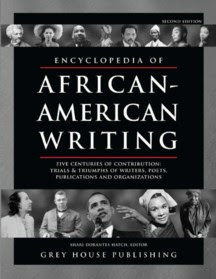ENCYCLOPEDIA OF AFRICAN-AMERICAN LITERATURE
ENCYCLOPEDIA OF AFRICAN-AMERICAN LITERATURE
Editor: Wilfred Samuels;
Associate Editors: Loretta Gilchrist Woodard, Tracie Church Guzzio.
“Facts On File” Publishing; 2008; 630 pp
~ The alphabetically arranged entries in this volume cover the full spectrum of African-American Literature, from the seminal poetry of Phillis Wheatley to popular contemporary novelists like Bebe Moore Campbell and Terry McMillan. Literary movements like the Harlem Renaissance and the Black Arts Movement merit their own entries. Additionally, well-known anthologies, journals, and newsletters are included. There is even an entry for the stereotypes Sambo and Uncle Tom. Although novelists, poets, and playwrights are predominant, well-known non-fiction writers (Cornel West) and orators (Martin Luther King Jr.) are also covered. Some entries are devoted to popular-culture icons like Tupac Shakur, Sister Souljah, Public Enemy, Queen Latifah, and Spike Lee, included as much for their public presence and promotion of African American culture as for their facility with language. Famous works warrant their own entries — Invisible Man, “Letter from a Birmingham Jail,” The Color Purple, etc. The biographical entries outline the person’s significance, while those devoted to works provide a synopsis of the piece and of its critical reception. Entries are followed by useful bibliographies of 5–10 sources on average, which include books, journal articles, and Web Sites. Some of these resources are also compiled at the end of the volume in a selected “Bibliography of Secondary Sources.” Additionally, there is a selected list of “Major Works by African-American Writers.” The volume does not shy away from the controversial. For example, the issues surrounding the Confessions of Nat Turner (1831), which was actually written by Turner’s white attorney, are discussed, as is the contemporary novelization of The Confessions, by William Styron, widely considered to be a demonization of Turner’s character. Overall, this is a strong resource in terms of its scope and breadth. Because it covers so much in one volume, the entries cannot delve too deeply into their subjects. Still, it is an excellent starting point or background resource for anyone conducting research within the broad spectrum of African American literature. It complements resources such as "The Greenwood Encyclopedia of African American Literature" (2005), which covers more writers but does not have entries for works.
~ An essential encyclopedic reference, "Encyclopedia of African-American Literature" guides readers through the rich history of African-American writing. More than 500 engaging entries cover the people, works, and events that have come to define African-American literature. This invaluable resource includes such authors as James Baldwin, Toni Morrison, Langston Hughes, Gayl Jones, Ralph Ellison, and Gloria Naylor, and major works such as "A Raisin in the Sun", "Native Son, "The Color Purple", and "Invisible Man". These entries are enhanced by bibliographies that help readers pursue further research. Additional entries include characters, periodicals, important anthologies, movements, concepts, and other related topics. Spanning the colonial period to the Harlem Renaissance and modernist periods to the "Black Aesthetics" movement to the contemporary age, this book provides comprehensive coverage of the history of African-American literature.















































0 comments:
Post a Comment